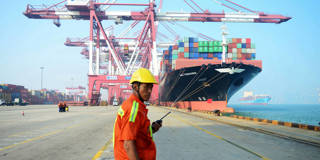China continues to treat only the symptoms, rather than the underlying cause, of its economic malaise. It ought to be doing whatever it can to increase domestic consumption and reduce excessive savings; instead it is relying on export markets in a world that is quickly abandoning free trade.
TAIPEI/CAMBRIDGE – In less than a month, leaders from business, government, civil society, and international organizations will be heading to China for an annual meeting organized by the World Economic Forum. This year’s “Summer Davos” is expected to focus on the next frontiers for growth, and China’s economy is set to be in the spotlight. It is well known that the world’s second-largest economy is struggling to achieve the government’s desired level of growth as it confronts large capital outflows, a real-estate bubble, an incipient debt crisis, and other issues. Yet deciphering the exact state of the country’s economy is difficult. With access to official data decreasing fast, some analysts question the credibility of publicly reported GDP statistics.

TAIPEI/CAMBRIDGE – In less than a month, leaders from business, government, civil society, and international organizations will be heading to China for an annual meeting organized by the World Economic Forum. This year’s “Summer Davos” is expected to focus on the next frontiers for growth, and China’s economy is set to be in the spotlight. It is well known that the world’s second-largest economy is struggling to achieve the government’s desired level of growth as it confronts large capital outflows, a real-estate bubble, an incipient debt crisis, and other issues. Yet deciphering the exact state of the country’s economy is difficult. With access to official data decreasing fast, some analysts question the credibility of publicly reported GDP statistics.